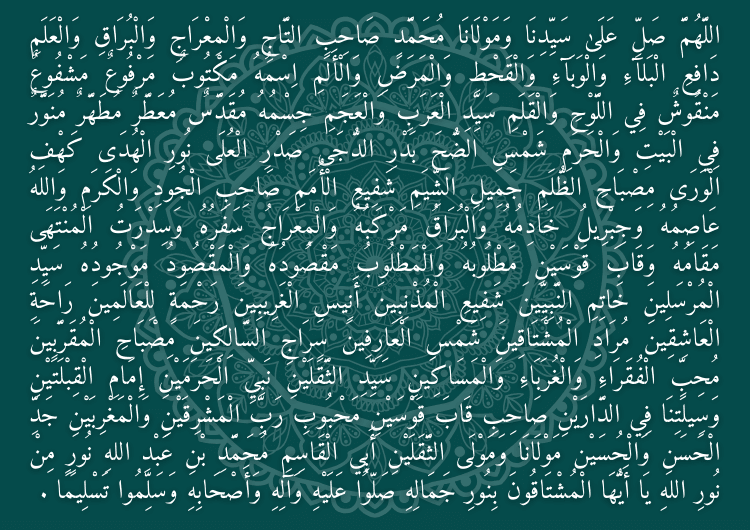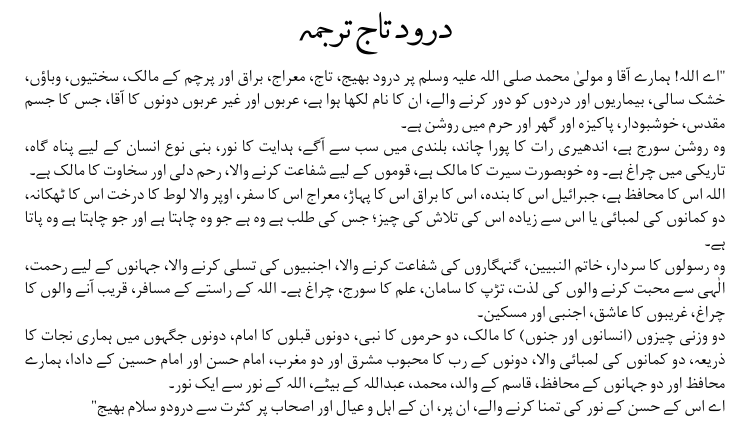Durood Taj, which is also called “Salaat-ul-Taj” or “The Crown Prayer,” is known as a very strong and special Darood Sharif. Think of it as a special way of sending very respectful greetings and blessings to Prophet Muhammad (SAW). People also call this Durood “Salaat-ul-Taj,” and that name means “The Crown Prayer.” It’s like a royal or very special prayer.
Durood e Taj Read Online

Darood Taj In English Translation
“O Allah! Send prayers upon our master and patron Muhammad, the possessor of the crown, the Mi’raj, the Buraq, and the flag, the repeller of hardships, epidemics, droughts, diseases, and pain. His name is written, exalted, combined, and engraved upon the tablet and pen. The master of both Arabs and non-Arabs, whose body is sanctified, fragrant, pure, and illuminated in the House and the Sanctuary.
He is the bright sun, the full moon of the dark night, the foremost in loftiness, the light of guidance, the cave of refuge for mankind, the lantern in darkness. He is of beautiful character, the intercessor for nations, the possessor of graciousness and generosity.
Allah is his protector, Gabriel his servant, the Buraq his mount, the Mi’raj his voyage, the Lote Tree of the Uppermost Limit his station, two bows’ length or nearer the object of his quest; that which is sought is that which he desires, and that which he desires is that which he finds.
He is the master of the Messengers, the Seal of the Prophets, the intercessor of sinners, the comforter of strangers, the mercy for the worlds, the delight of divine lovers, the object of yearning, the sun of the gnostics, the lamp for travellers upon the path to Allah, the lantern of those brought near, the lover of the poor, the strangers, and the destitute.
The master of the two weighty things (humans and Jinn), the Prophet of the two sanctuaries, the Imam of the two Qiblas, our means of salvation in both abodes, the one at two bows length, the beloved of the Lord of the two Easts and the two Wests, the grandfather of Imam Hasan and Imam Husayn, our protector and the protector of the two worlds, the Father of Qasim, Muhammad, the son of Abdullah, a light from the light of Allah. O you who yearns for the light of his beauty, invoke abundant blessings and peace upon him, his family, and companions”.

Darood e Taj in Roman:
Allāhumma ṣalli ʿalā Sayyidinā wa Mawlānā Muḥammad ❁ ṣāḥibi t-tāji wa-l-Miʿrāji wa-l-Burāqi wa-l-ʿalam ❁ dāfiʿi l-balā’i wa-l-wabā’i wa-l-qaḥṭi wa-l-maraḍi wa-l-alam ❁ ismuhu maktūbun marfūʿun mashfūʿun manqūshun fi-l-lawḥi wa-l-qalam ❁ sayyidi l-ʿarabi wa-l-ʿajam ❁ jismuhu muqaddasun muʿaṭṭarun muṭahharun munawwarun fi-l-bayti wa-l-ḥaram ❁ shamsi ḍ-ḍuḥā badri d-dujā ṣadri l-ʿulā, nūri l-hudā, kahfi l-warā miṣbāḥi ẓ-ẓulam ❁ jamīli sh-shiyam ❁ shafīʿi l-umam ❁ ṣāḥibi l-jūdi wa-l-karam ❁ wa Llāhu ʿāṣimuhu, wa Jibrīlu khādimuhu, wa-l-Burāqu markabuhu, wa-l-Miʿrāju safaruhu, wa Sidratu l-Muntahā maqāmuhu, wa qāba qawsayni maṭlūbuhu, wa-l-maṭlūbu maqṣūduhu wa-l-maqṣūdu mawjūduh ❁
Sayyidi l-mursalīn ❁ khātimi n-nabiyyīn ❁ shafīʿi l-mudhnibīn ❁ anīsi l-gharībīn ❁ raḥmatin li-l-ʿālamīn ❁ raḥati l-ʿāshiqīn ❁ murādi l-mushtāqīn ❁ shamsi l-ʿārifīn ❁ sirāji s-sālikīn ❁ miṣbāḥi l-muqarrabīn ❁ muḥibbi l-fuqarā’i wa-l-ghurabā’i wa-l-masākīn ❁ sayyidi th-thaqalayn ❁ nabiyyi l-ḥaramayn ❁ imāmi l-qiblatayn ❁ wasīlatinā fi-d-dārayn ❁ ṣāḥibi qāba qawsayn ❁ maḥbūbi rabbi l-mashriqayni wa-l-maghribayn ❁ jaddi l-Ḥasani wa-l-Ḥusayn, mawlānā wa mawlā th-thaqalayn ❁ abi l-Qāsimi Muḥammadi bni ʿAbdi Llāh ❁ nūrin min nūri Llāh ❁ yā ayyuha l-mushtāqūna bi-nūri jamālihi ❁ ṣallu ʿalayhi wa ālihi wa-aṣḥābihi wa sallimū taslīma ❁
What Is Durood e Taj?
Darood-e-Taj means “Owner of the Crown”. Its purpose is to send salutations to the Beloved of Allah Ta’ala, the Tajdar of the Two Worlds Prophet Muhammad ﷺ. Many great saints recited this Salaat-ul-Taj regularly, including Allama Syed Qasim Shah Bukhari (may Allah have mercy on him) and Faqir Millat Syed Meerak Shah Kashani (may Allah have mercy on him). This Salaatul Taj is especially popular in the Indian subcontinent, and the Sufis here have included it in their routines. Even today, millions of Muslims read Durood taj with love and devotion.
This Durood e Taj was written down by a respected religious leader named Hazrat Sheikh Abu Bakr bin Salem. Hazrat Sheikh Abu Bakr bin Salem was born a long time ago in a city called Tarim, which is in a place called Hadramaut in Yemen. This was in the year 919 in the Islamic calendar (called Hijri), which is like the year 1513 in the calendar used in many Western countries (called CE).
Benefits Of Darood e Taj:
Prophet Muhammad ﷺ and the help of Allah Almighty bring us all the benefits of Salaatul Taj. But, to really get those benefits, it’s important to be honest and serious when you say this prayer. You also need to keep saying it regularly, not just once in a while. Being sincere and doing it consistently is key. And it’s important to say this prayer in a way that follows the rules of Islam (called Shariah).
- Purification of the heart and spiritual purity are achieved.
- Gets rid of whispers and bad thoughts.
- Light is born in the heart.
- In dreams, one is blessed with the fortune of visiting the Prophet Muhammad (SAW).
- In faith comes strength.
- The spiritual position is elevated.
- The knowledge of Allah Almighty increases.
- It becomes a means of forgiveness of sins.
- Repentance is granted.
- Self-improvement takes place.
- Halal sustenance increases.
Related FAQs
Who is the author of Durod Taj?
The author of Durood Taj is Hazrat Sheikh Abu Bakr bin Salem, may God bless him and grant him peace, who was born in 919 Hijri (1513 CE) in Tarim, Yemen. He was a great religious scholar and Sufi sage of his time.
Which Durood is recited in a dream for the visitation of Prophet Muhammad ﷺ?
Durood Taj is said to be a good way to see the Prophet ﷺ in a dream. It is recommended to recite it 170 times on 40 Thursday nights, but with sincerity and a pure heart.
Is reciting Durood Taj a shirk?
No, reciting Durood Taj is not shirk. Reciting Durood is proven by the Quran and Hadith. Allah Ta’ala himself has ordered the recitation of Durood in the Holy Qur’an. Durood Taj is also a way of salutations and greetings to the Holy Prophet (PBUH).
Can I recite Durood-e-Taj for wealth?
Yes, you can recite Durood-e-Taj for abundance of Halal sustenance. For this, it is recommended to read 7 times after Fajr or 7 times between Tahjud and Fajr.
https://daroodtaj.pk/ Darood Taj, also known as Durood e Taj, is a special form of salutation and praise (known as salawat) that is recited in honor of the Prophet Muhammad (peace be upon him). This Durood is revered for its profound spiritual significance and is recited by many Muslims to seek blessings, protection, and peace. It is highly valued for its ability to invoke divine mercy and is believed to offer spiritual and worldly benefits to those who recite it regularly. https://daroodtaj.pk/